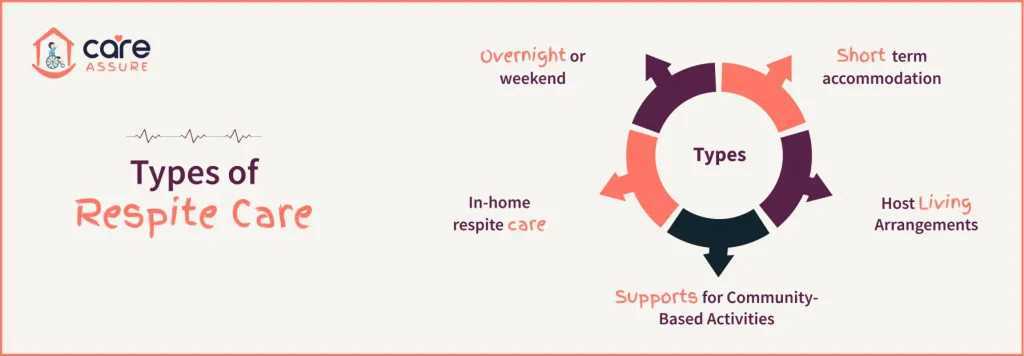Everything you need to know about NDIS Respite Care
May 17, 2025
|By Careassure
|6 min read

Caregivers require a method to take a break from their obligations. In such situations, respite care becomes necessary. NDIS participants are granted access to diverse support services, including NDIS Respite Care. It is a particular support that relieves those with disabilities and their caregivers. This type of support can be observed in various settings, including facility-based respite, in-home respite, and recreational respite. It provides caregivers with an essential respite from their daily duties. In this guide, we will provide comprehensive information on NDIS respite care and its importance.
What is Respite Care?
Respite care entails placing the person receiving care under the temporary supervision of another carer for a predetermined time. Care during a respite can last for as little as a few hours or as long as several days or weeks. Respite care provides short-term relief for carers so they can travel, take care of other responsibilities, or simply enjoy some much-needed rest. Respite care is a flexible form of care that can be adapted to fit the requirements of the primary carer and the person receiving care.
When a primary carer needs to leave town for a few days, respite care providers can step in to provide care for the care recipient in their own home. Alternatively, the care recipient can receive care at a senior living community and then return home when their primary carer returns. Respite care can also be a more casual arrangement in which the primary carer invites a friend or loved one to sit with the care recipient while the primary carer deals with other responsibilities.
How does NDIS Respite care work?
Once you have an accepted NDIS plan that includes funding for respite care, do the following:
- Look into service providers.
![icon]()
- Pick the one that fits your wants, your values, and the plan's goals.
![icon]()
- Then, make an appointment for the service that works for you.
![icon]()
- A caregiver will step in to help with the tasks during the respite time.
![icon]()
- The main caregiver can rest and recover, knowing their loved one still receives help and support.
![icon]()
- You should keep track of how long to ensure you don't exceed your budget.
![icon]()
- During your annual NDIS review, you can review your needs again and change your plan as needed.
![icon]()
Types of Respite Care
The NDIS offers different types of respite care to meet the needs of disabled people and those who care for them. Giving caregivers a break is very important, and this helps keep family ties and well-being strong. There are several types but here are the top five types of respite care.

NDIS Respite Housing Options
1. Short-term Accommodation (STA)
Short-term accommodation, including NDIS respite care, is available if you need assistance while away from home for a brief period. If STA is included in your NDIS plan, you can receive up to 28 days of support annually, usually in periods of up to 14 consecutive days. For those requiring extended support, options like Supported Independent Living (SIL) or long-term accommodation may be more suitable.2. Host Living Arrangements
Host living arrangements allow you to live with a friend or family member who provides support with daily activities and emotional care. This setup, also known as Individualised Living Options (ILO), creates a family-like environment where you receive the help you need while sharing a household. Support is covered under your NDIS plan, making it an affordable and flexible choice for respite care.3. Supports for Community-Based Activities
Participating in social and recreational activities is essential for maintaining health and independence. The NDIS, through the Temporary Transform Payment (TTP) process, supports individuals in engaging with community programs, lifestyle activities, supported employment, and other community-based supports to enhance their quality of life.4. In-home Respite Care
In-home respite care brings support directly to your residence, where a professional carer can engage with you in activities, offer companionship, and teach new skills. This form of respite can also extend to overnight stays, providing flexibility and comfort within your own space.5. Overnight or Weekend Respite Care
Overnight or weekend respite care, also known as "residential respite," allows for care at home or in a facility during extended periods. This can include:- Active overnight support for those requiring assistance during the night, such as repositioning or personal care
- Sleepover support for individuals needing occasional night-time assistance
Conclusion
NDIS respite care is a lifesaver for people who care for disabled people. It gives them a break from caring for others for a short time so they can recharge and take care of their own needs. It is an important service that greatly helps NDIS users and gives their caregivers time to care for themselves. We are here to help because we know how hard it can be to take care of someone with a disability. You can count on Care Assure to always be a safe place when you need a respite care service.
Frequently Asked Questions (FAQs)
Considering a short stay has many benefits, including trying new activities, meeting new friends, developing new skills, giving informal support a break, and providing temporary accommodation support.





